
National Entrepreneur's Day is a fairly recent national holiday that came into prominence in 2010 when our forever POTUS Barack Obama proclaimed it as such. Since then, the official day has fallen on every third Tuesday of November, meaning this year, November 17 is the moment we raise our glasses in a toast to all of the self-made entrepreneurs out there who have made a bustling empire virtually out of nothing. We see you, sis! Between the endless hours of hard work and the blood, sweat, and tears that go into growing a vision into its fullest potential, the road to being self-made is not one without sacrifice.
Furthermore, as Black women, entrepreneurship holds even more of a special place in our hearts as we strive to become our ancestors' wildest dreams by stepping into our true power. And as the fast-growing group of entrepreneurs in our nation, becoming our own bosses gives us the tools to write our own paychecks in a world that tells us our worth is 63 percent of what non-Hispanic white men are paid. In that way, entrepreneurship has acted as a vessel for Black women to take control of their career and financial destinies while living lives that they love.
To commemorate this National Entrepreneur's Day, here are 11 of our favorite entrepreneurs elevating their hustle and making money moves in 2020 and beyond that you need to follow ASAP.
Monique Rodriguez
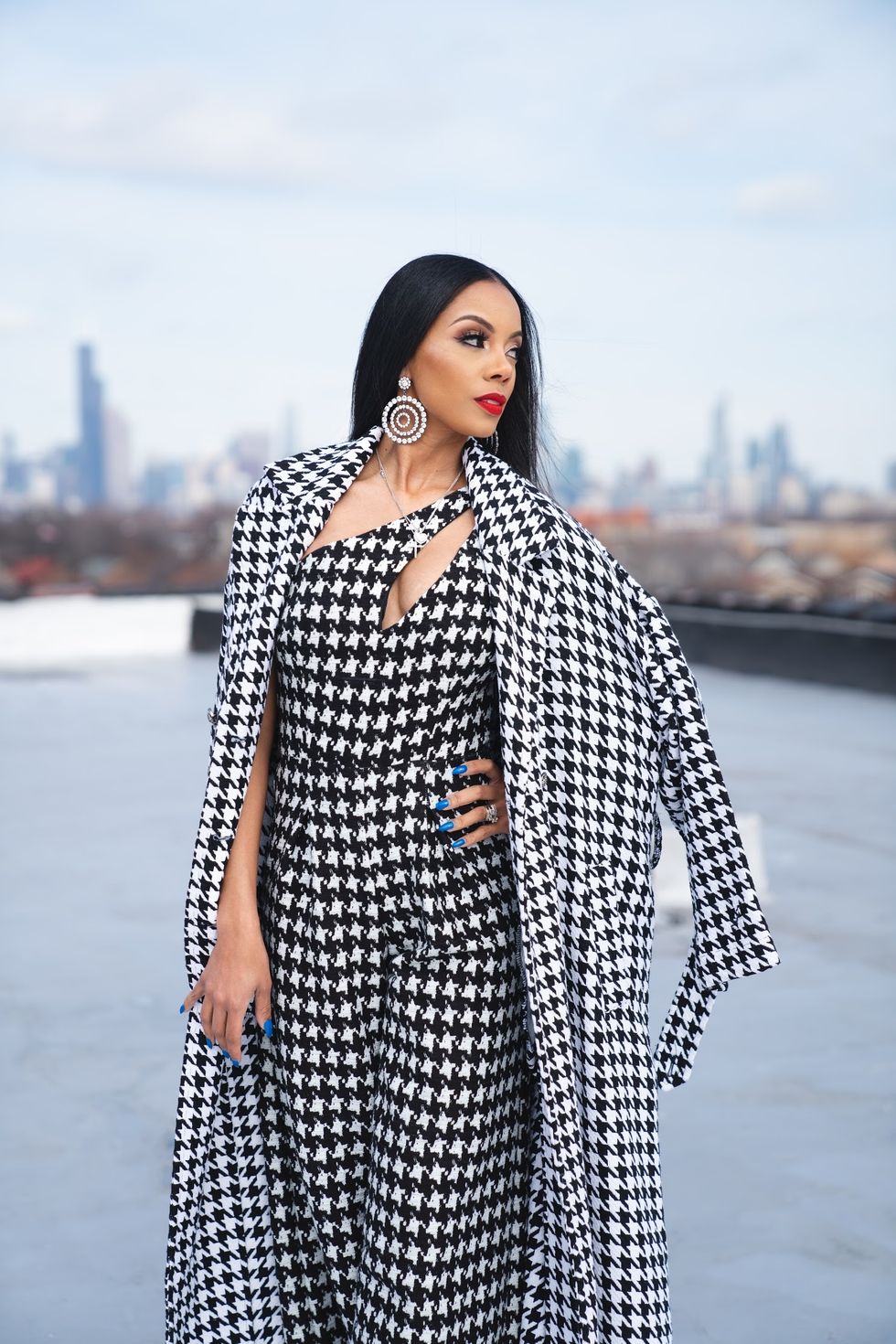
Courtesy of Monique Rodriguez
Founder and CEO of Mielle Organics, Monique Rodriguez is a millionaire mogul through and through. The SHEeo went from being an RN and preparing her hair coveted hair products at home to having her products line the shelves of over 100K stores worldwide -- and we live! She credited her self-made journey to millions to a vision planted in her heart and mind by God.
In an xoNecole exclusive, she shared that her entrepreneurial endeavors took root well before she knew it was possible for her efforts to bear fruit. And this year, she sought to create a similar legacy with the creation of More Than a Strand. She told xoNecole in regards to her story:
"I want people to look at me [and] I want them to see themselves in me. And to see that, listen, this was a girl who was just from the Southside of Chicago that had a dream and she was able to accomplish her dream. She had a lot of faith and little experience, but look what she was able to accomplish."
Follow Monique on Instagram @exquisitemo.
Watchen Nyanue
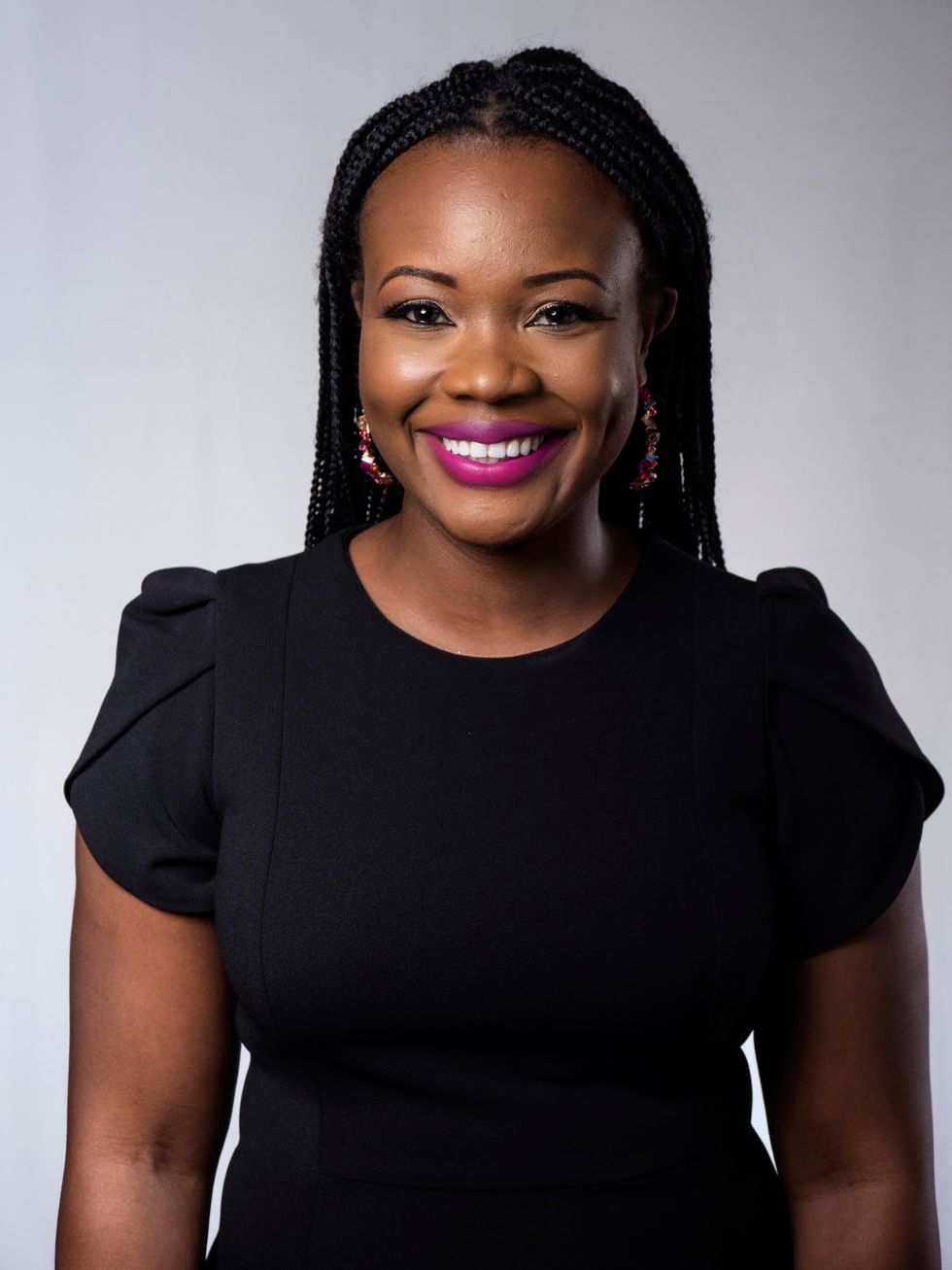
Courtesy of Watchen Nyanue
Founder and CEO of I Choose the Ladder, Watchen Nyanue is doing her best to provide Black women in corporate spaces with the tools to "climb the ladder" of success the way that they want to achieve it. The Liberian-born entrepreneur saw a void in the opportunities and rooms Black women were allowed access to and sought to change it with the creation of her career consulting company as well as her career summit, The Climb. It's clear elevating Black women is her mission. She revealed to xoNecole:
"I love us for real. If you get us in a position to win, we're always going to make sure that we all win."
Follow I Choose the Ladder on Instagram @ichoosetheladder.
Melissa Butler
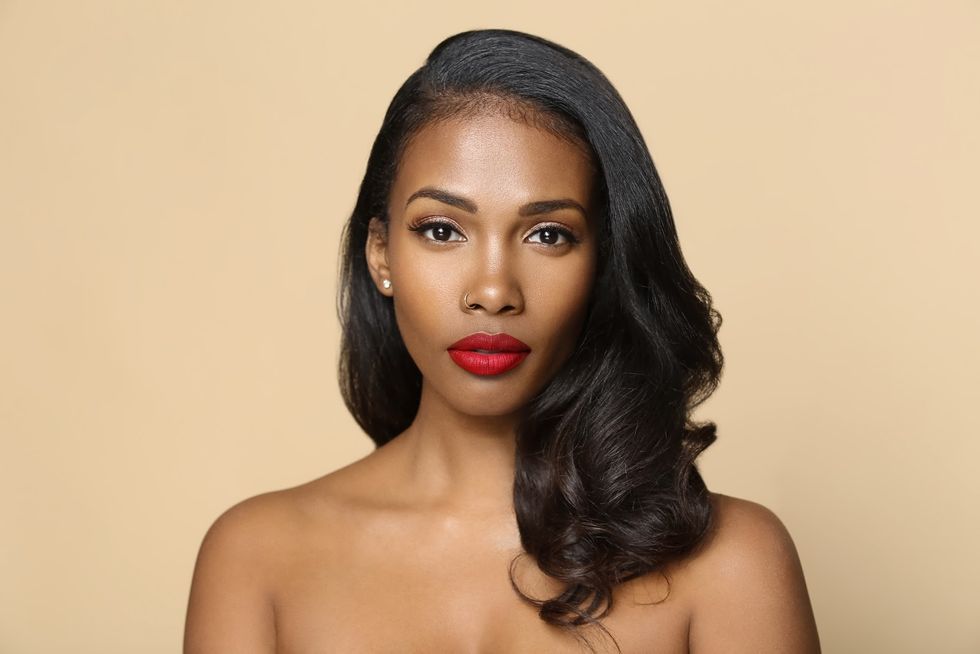
Courtesy of The Lip Bar
The Lip Bar founder Melissa Butler has come a long way since facing rejection from the critically-acclaimed ABC series Shark Tank. The self-proclaimed "rebel with a cause" dared to be different and dared to be great by turning her "no" into the only "yes" that mattered: her own. She fought for her brand of cocktail-inspired bold vegan lipsticks to become what it is today, a bonafide beauty empire that now includes foundation and a recently-launched concealer. In conversation with xoNecole earlier this year, Melissa shared how the customer stays at the forefront of her mind as a leader:
"I'm understanding that in time, things change, the customer's needs change. My job as the leader of the organization is to make sure that I'm always serving the customer."
From startup to household name, Melissa is definitely an entrepreneur to follow.
For more of Melissa, follow her on Instagram @melissarbutler.
The Brown Bohemians
 Courtesy of The Brown Bohemians
Courtesy of The Brown BohemiansThe Brown Bohemians are culture curators and co-founders Vanessa Coore Vernon and Morgan Ashley who together spearhead the mission to being the change they wish to see in their community with The Bohemian Brands. The two, who started as best friends before evolving into business partners, created their brand to emphasize the color that is often washed out of the bohemian space. In addition to self-care, intersectionality is a huge focus of the duo and painting a lifestyle brand representative of the fully-realized self-expression of Black and brown bohemians. This year, the entrepreneurs dropped their latest project, a 200+-page coffee table book, Brown Bohemians: Honoring the Light and Magic of Our Creative Community.
When discussing their intention of infusing their Black and queer identities into their brand, Morgan Ashley shared with xoNecole:
"Identifying as a woman, a Black woman, and a queer Black woman is extremely important to me. I would like to say that I put a ton of attention behind it and always want to put it on the forefront, but it just happens organically because those are things that I'm so proud to be. It just comes across in everything that I do. Blackness and conversation around race and ethnicity are in everything."
To follow Vanessa, follow her @thebazaarbohemian and to follow Morgan, follow her @oaklantathebohemian.
Jamisa McIvor-Bennett
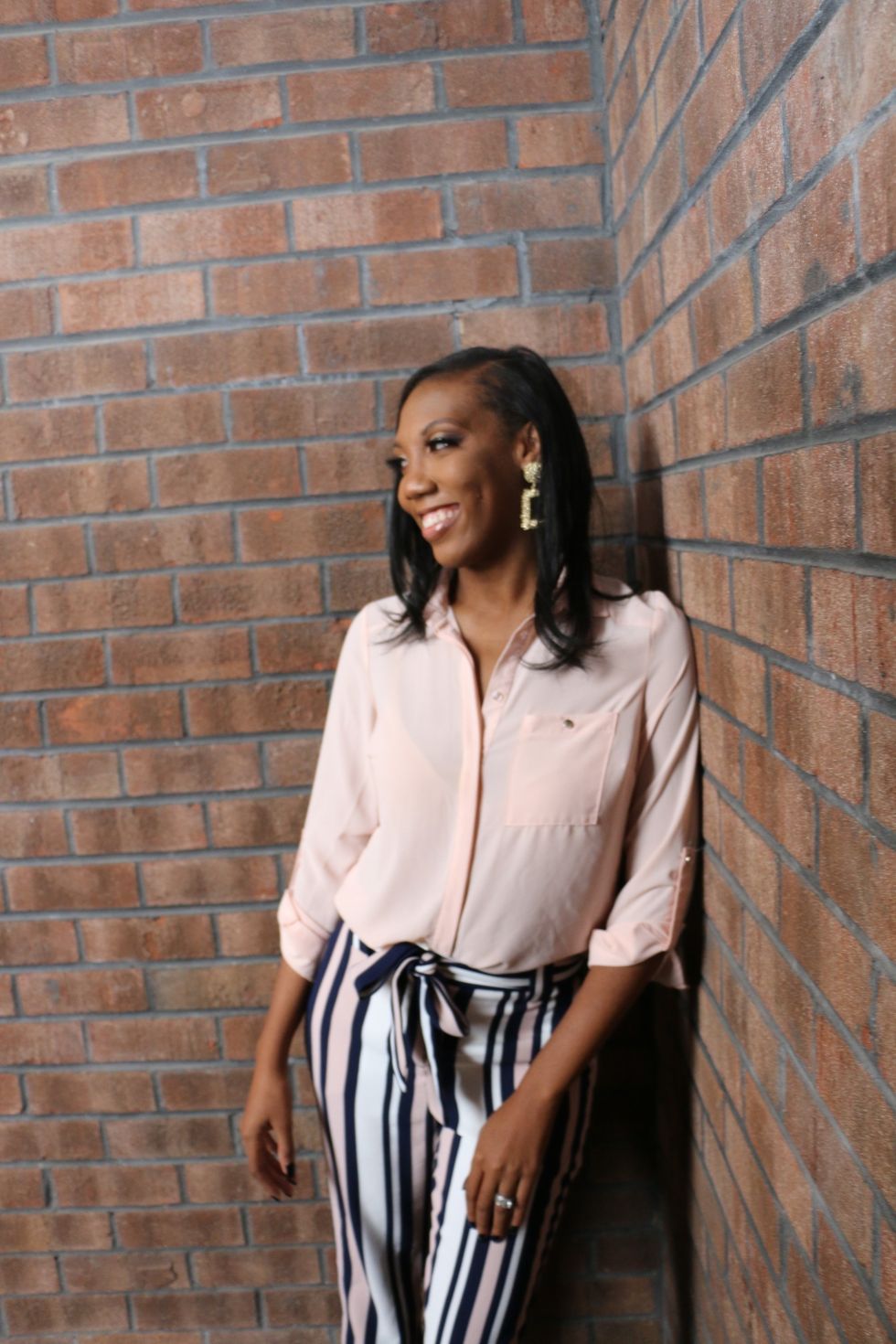 Courtesy of Jamisa McIvor-Bennett
Courtesy of Jamisa McIvor-BennettJamisa McIvor-Bennett is a testament to the financial freedom that can be waiting for you on the other side of generational wealth and an impressive multi-million-dollar real estate portfolio. The now-26-year-old was 19 working in a supermarket when her grandmother changed her life by giving her a quitclaim deed transfer to her house for a total of $400. That property would lay the groundwork for the portfolio of 21 properties and counting she owns under her belt. The real estate guru spoke to xoNecole earlier this year about her path and dropped gems on how others could follow suit:
"Right now, my portfolio total is $3.2 million, cash flow is a little under $50,000 a month."
Let's just say, we'll have what she's having.
For more of Jamisa, follow her on Instagram @rosebudsinvestment.
Alex Elle
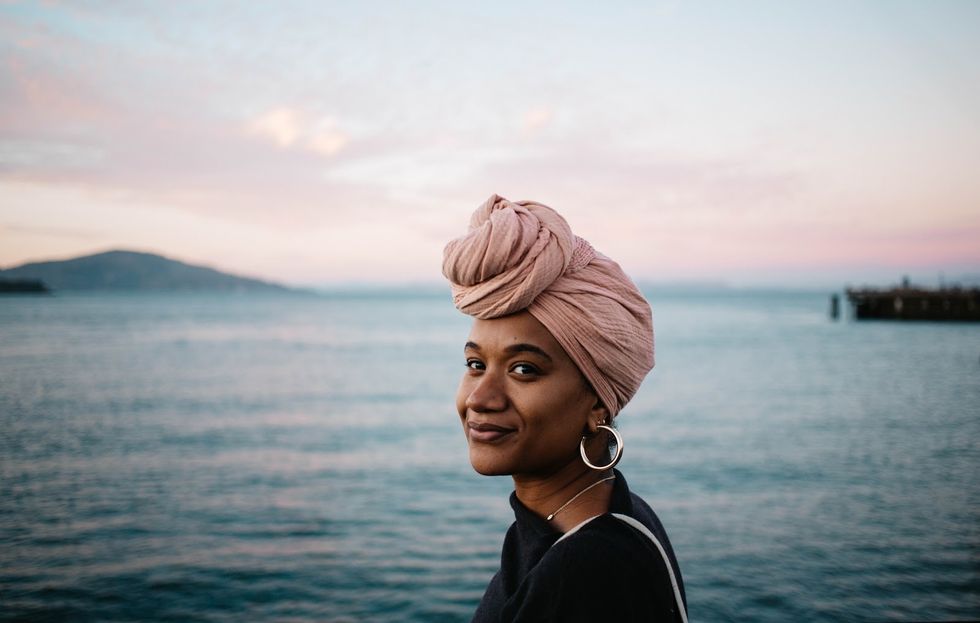 Courtesy of Alex Elle
Courtesy of Alex ElleAlex Elle is a true testament of the abundance that await you when you stand firmly in your truth and allow transparency to reign supreme. The former blogger has worn many hats and had many businesses, but known of them stuck quite like words have. The healer has used her gift with the pen to touch others and become a leader in the self-love movement. Since amassing hundreds of thousands of followers on Instagram, Alex has also lent her gifts to writing, authoring books like Love in my Language and the recent After the Rain.
In a recent conversation with xoNecole, she revealed how doing the (inner) work led her to her best life:
"When it comes to my process: self-choosing has been like a prayer; it's been a meditation and a mantra. Being able to hold myself accountable when I get it right and when I get it wrong has really been the greatest lesson in writing for me. The turning point was knowing I wanted something different in my life and knowing that I could access it, I just had to show up and do the work, even if it was scary and daunting. And it still is sometimes."
Follow Alex on Instagram @alex_elle.
Mariee' Revere
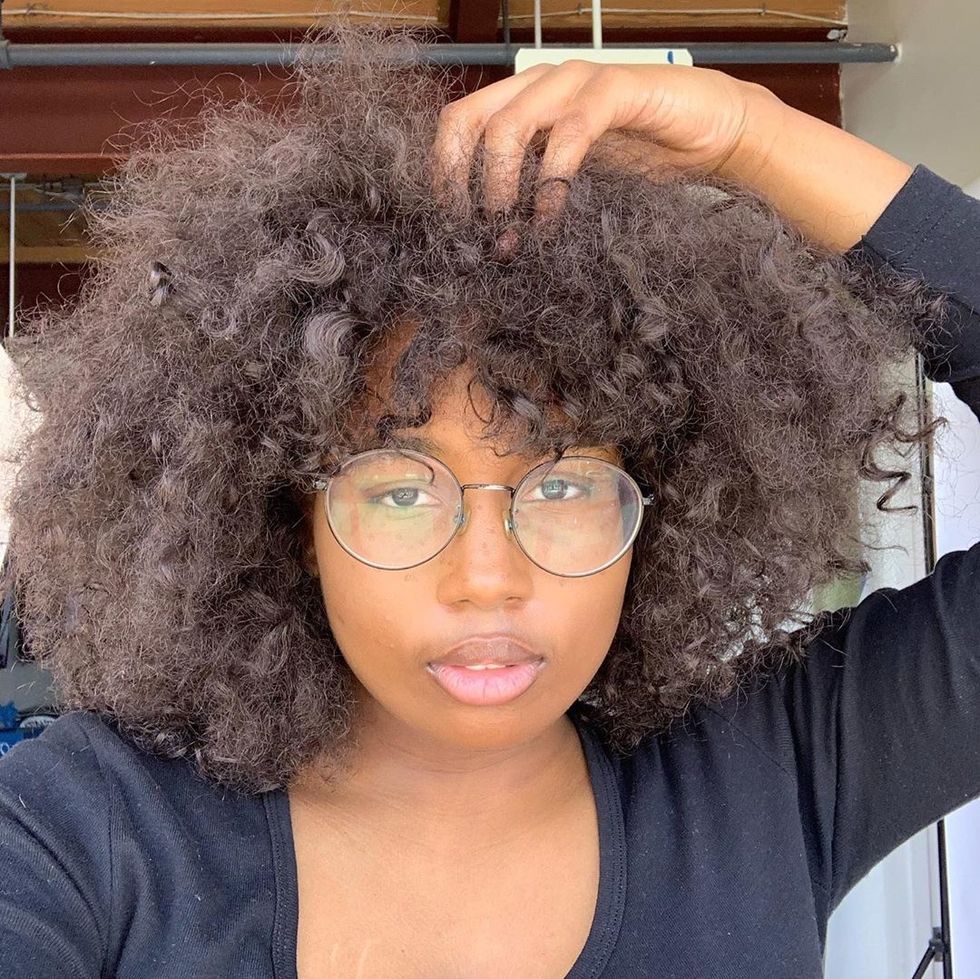
Instagram/@parmoonx
We all live for moments when well-deserved brands or creators get the credit that they are due. At xoNecole, we love ourselves some dope skincare, so of course MoonxCosmetics came on our radar. The black woman-owned vegan skincare brand is founded by entrepreneur Mariee' Revere and had the ultimate viral moment earlier this year when they made $1.8 million in sales in 9 minutes.
Though the company has been a thing for three years, they truly started to see the fruits of their labor this year after 20,000+ orders catapulted them into seeing Ms in sales in a matter of minutes. Next up, we're sure we'll see the beauty entrepreneur's brand lining the shelves of our favorite retail stores. Keep glowing and growing Queen!
For more of Mariee', follow her on Instagram @parmoonx.
Jasmine Jordan
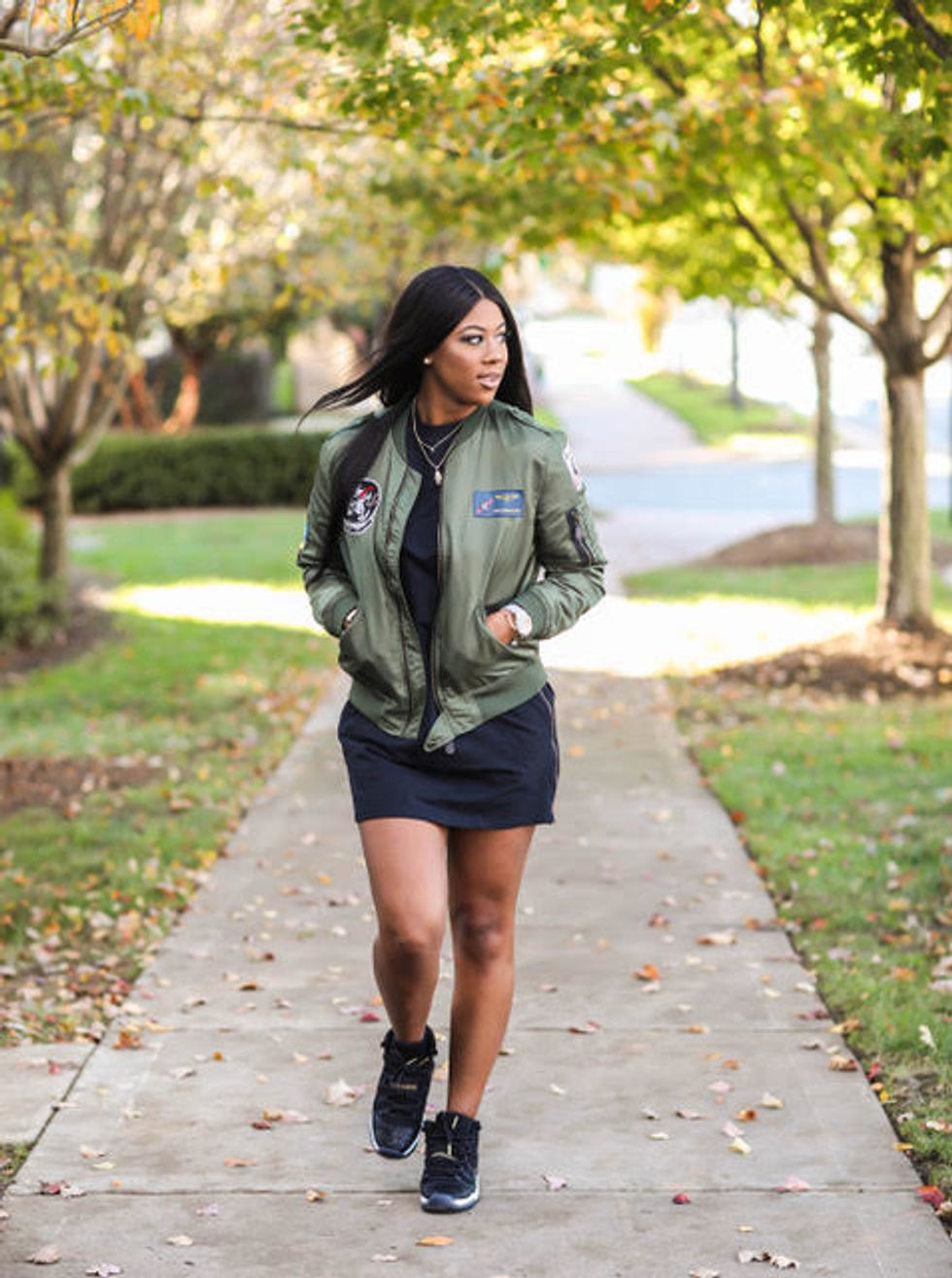 Courtesy of Jasmine Jordan
Courtesy of Jasmine JordanJasmine Jordan's father might be a legend, but the mogul-in-the-making is establishing a legacy all her own through her pioneering work with the Jordan brand. Although some people might feel that she has a leg up in life because of her famous dad, Jasmine has worked hard for her opportunities and her subsequent wins. In conversation with xoNecole earlier this year, she noted:
"Do I reap the benefits of it being his daughter? Absolutely. But I have no right to claim those things, and I never do because those are his accomplishments. I'm his daughter and I'm still going to make a name and do whatever I need to do so people can see me for me."
"If I can have my work ethic, my accomplishments, and my success on projects outshine the fact that I'm my father's child, then my job is done."
For more of Jasmine, follow her on @mickijae.
Tika Sumpter & Thai Randolph
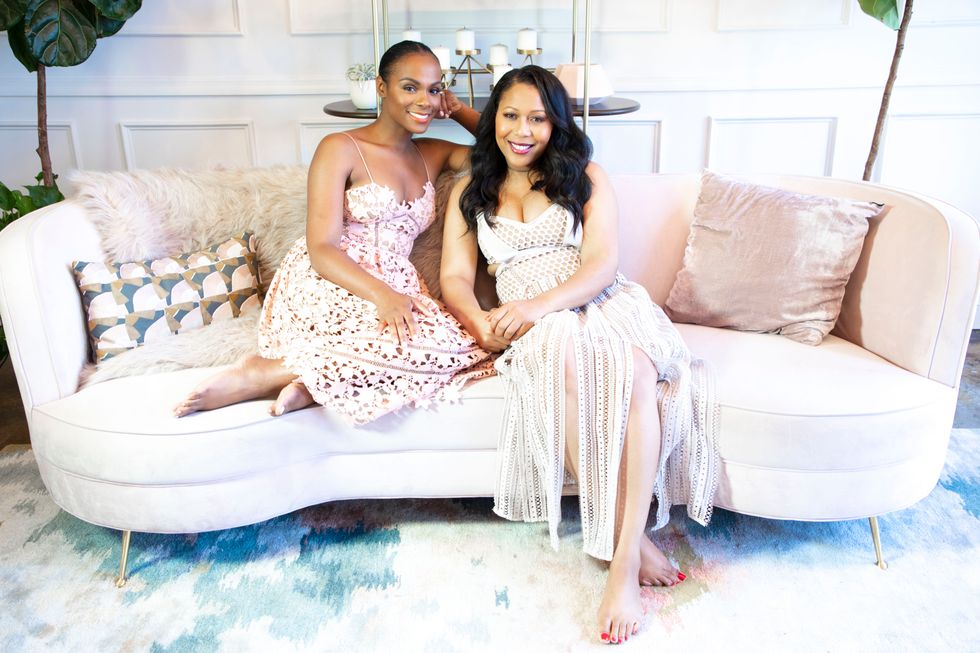
Courtesy of SugaBerry
The ladies behind SugaBerry are Tika Sumpter and Thai Randolph. With the modern-day mom-focused brand is a major pivot in Tika's career who has shifted from acting to pour into entrepreneurship. Alongside Thai, the co-founders are inviting moms of color to indulge through their website, social media platforms, and podcast. In a conversation with xoNecole, Tika stated:
"There are a million websites on motherhood, and we were barely there."
Thai shouted out the significance of SugaBerry's presence in this space by adding:
"Historically, Black women have not been depicted as vessels deserving of care. We've seen in a caretaker's context. The idea that there should be indulgent self-care afforded us...that is a foreign concept to so many people."
Follow Sugaberry on Instagram @thesugaberries.
Are you a member of our insiders squad? Join us in the xoTribe Members Community today!
Featured image by Shutterstock
- 12 Women Entrepreneurs To Keep On Your Radar - xoNecole ... ›
- 12 Black Female Financial Gurus You Need To Follow - xoNecole ... ›
- We Teach Female Entrepreneurs How To Succeed In Their ... ›
- This Documentary Chronicling Black Women Entrepreneurs Is Your ... ›
- How Pantene & The Wing Are Closing The Revenue Gap For ... ›
- Best Instagram Accounts For Entrepreneurs - xoNecole: Women's Interest, Love, Wellness, Beauty ›
- Black Women Founders On Black Joy, Products - xoNecole: Women's Interest, Love, Wellness, Beauty ›
- 12 Black Women Financial Gurus You Need To Follow - xoNecole: Women's Interest, Love, Wellness, Beauty ›
- How To Quit Your Job To Become An Entrepreneur - xoNecole: Women's Interest, Love, Wellness, Beauty ›
This Is How To Keep 'Holiday Season Stress' From Infecting Your Relationship
Hmph. Maybe it’s just me, but it seems like there is something really weird happening in the fall season air (because winter doesn’t officially begin until December 21) that cuddle season is in full swing while break-up season is as well. In fact, did you know that break-ups are so popular during the holiday season that December 11 is deemed Break-Up Day?
The reasons why relationships shift around this time vary; however, I did both roll my eyes and chuckle when I read that a very popular one is because it’s an easy way to get out of getting one’s significant other a Christmas present. SMDH.
Anyway, I personally think that the less shallow folks out here may contemplate calling things “quits” or they at least distance themselves a bit from their partner (and what I’m referring to is serious relationships) due to all of the stress and strain that oftentimes comes with the holidays whether it be financial, familial, due to their tight schedules or something else.
Listen, I would hate for you and your man to miss the fun and happiness of experiencing this time of year, all because you are so overwhelmed or irritated that you can’t really enjoy it. That’s why I have a few practical tips for how to avoid allowing the typical holiday season stress from INFECTING your relationship.
Manage Your Expectations
 Giphy
GiphyUnmanaged expectations. If there is a main reason why the holiday season tends to be so stress-filled for so many people, I’d bet good money that this is the cause. And when you’re in a long-term relationship, expectations can manifest themselves in all sorts of cryptic and/or unexpected ways. You might have relatives who assume that you are going to be with them for Thanksgiving or Christmas when you have other plans in mind. You might be thinking that you are going to spend one amount for presents while your man is thinking something totally different. When it comes to scheduling, your signals may be crossed.
And you know what? To all of these scenarios, this is where clear and consistent communication come in. Don’t assume anything. Don’t dictate anything either. From now until New Year’s, mutually decide to check in once a week, just to make sure that you are both on the same page as it relates to the holidays and what you both are thinking will come along with it. The less blindsided you both feel, the less stressed out you will be. Trust me on this.
Set (and Keep) a Budget
 Giphy
GiphyOkay, so I read that last year, 36 percent of Americans incurred some type of holiday-related debt. Hmph. Last year, there was still some sense of normalcy in this country, chile, so I can only imagine what finances are gonna look like over the next several weeks. That said, since I don’t know a lot of people who don’t find being broke stressful, make sure that you and your bae set a budget and then stick to it this year — no ifs, ands or buts.
Because really, y’all — it doesn’t make sense to deplete savings and/or max out credit cards for a few days of giggles only to be damn near losing your mind because you don’t know how to make ends meet come Dr. Martin Luther King, Jr. Day.
And by the way, this tip doesn’t just speak to things like food and gifts; I also mean travel. If it doesn’t make a ton of sense (or cents) to be all over the place this year — DON’T BE.
Keep Matthew 5:37 at the Forefront
 Giphy
GiphyIf off the top of your head, you don’t know what Matthew 5:37 says, no worries, here ya go: “But let your ‘Yes’ be ‘Yes,’ and your ‘No,’ ‘No.’ For whatever is more than these is from the evil one.” That verse right there? Oh, it’s a boundaries lifesaver! I say that because do you see “maybe” or “I’ll think about it” in there? Nope. LOL. It says that you should tell people “yes” or “no” and leave it at that — and that complements Anne Lamott’s quote, “’No’ is a complete sentence” impeccably well. Yeah, you’ve got to remember that anything beyond a yes or no to a request is privileged information; you don’t owe anyone details or an explanation.
Besides, if you are really honest with yourself, when someone asks you something and you give a “Umm, let me think about it” kind of reply, more times than not, you already know what your answer is going to be — so why not let you both off of the hook? Give your response. Commit to that. And let everyone (including yourself) get on with their lives and schedules.
I promise you that when it comes to those holiday parties, you are pissing more folks off by not RSVP’ing or doing so and not showing up than just saying, “Thank you but not this year” off the rip.
Remember That Your Personal Space Is Privilege Not a Right
 Giphy
GiphyA friend of mine recently bought a new house and invited me over to come see it. He’s a single man with no children, so as I was taking in all of the space that he had, especially as I walked through his finished basement, I joked about relatives coming to live with him. “Hell no” and “absolutely not” were pretty much his immediate responses as he went on to say that some folks even had the nerve to be offended when he told them that he had no intentions on taking DNA in.
Ain’t it wild how people think that your stuff is their right? And yes, that brings me to my next point. Your home is your sanctuary space. If you want to host folks this year — cool. If not, ALSO COOL. Please don’t let folks (family included) guilt you into how they want you to act or even into what they would do if the shoe was on the other foot. You are not them — and as one of my favorite quotes states, “If two people were exactly alike, one of them would be unnecessary.” (A man by the name Larry Dixon said that.)
Hell, my friends? They know that I am good for sending them random things that they need or even want all throughout the year. Coming over to hang out at my pace, though. Uh-uh. Chalk it up to being a card-carrying member of the ambivert club yet I like keeping my living space personal — and I sleep like a baby, each and every night, for feeling that way.
Always remember that your space, your time, your resources, your energy and shoot, yourself period (including your relationship), are all things that are your own. You get to choose how, when and why you want to share them. The holiday season is certainly no exception.
Cultivate Some “You Two Only” Traditions
 Giphy
GiphyIt’s not uncommon for some couples to hit me up after the holiday season to “detox.” Sometimes it’s due to the financial drama (and sometimes trauma) that they experienced. Sometimes it’s because they allowed their relatives (especially in-laws) to get more into their personal business than they should’ve. More than anything, though, it tends to be because they didn’t get enough quality time together and so ended up feeling “disconnected.”
Please don’t let that happen. Listen, I’m not even a holidays kind of woman and yet, I will absolutely sit myself down with some hot chocolate and chocolate chip cookies to enjoy a Hallmark holiday film or two. Aside from the fact that most of them are lighthearted and sweet, I also like that they usually focus on couples loving on each other amidst all of the holiday beauty and ambiance — which is something that all couples should set aside some time to do.
Maybe it’s a vacation. Maybe it’s a staycation. Or maybe it’s my personal favorite, A SEXCATION. Whether it’s for a few days, the weekend or even overnight — don’t you let the holidays go by without setting aside time for you and your man to celebrate one another. Don’t you dare (check out “Are You Ready To Have Some Very Merry 'Christmas Sex'?”).
GET. SOME. REST.
 Giphy
GiphyI once read that 8 out of 10 people get stressed out over the holidays and 3 out of 10 lose sleep during to it — and when you’re stress-filled and sleep-deprived, that can absolutely lead to hypersensitivity, making mountains out of molehills and even not being in the mood for sex.
Your relationship can’t afford to go through any of this, so definitely make sure to prioritize rest. I don’t care how unrealistic it might seem during this time, sleep should never be seen as a luxury; it will always and forever be a great necessity.
That said, try to get no less than six hours of shut-eye in (check out “6 Fascinating Ways Sex And Sleep Definitely Go Hand In Hand”) and even ask your bae to take a nap with you sometimes (check out “Wanna Have Some Next-Level Sex? Take A Nap, Sis.”). Not only will sleep help to restore your mind, body and spirit but, when it’s with your partner, it’s an act of intimacy that can make you both feel super connected, even in the midst of what might feel like chaos.
___
Holiday season stress is real. Still, never give it the permission or power to throw your relationship off. Put you and your man first and let the holidays be what they are gonna be, chile.
Let’s make things inbox official! Sign up for the xoNecole newsletter for love, wellness, career, and exclusive content delivered straight to your inbox.
Featured image by Shutterstock
While doing a podcast interview a couple of weeks ago, when I said my age, the interviewer complimented me by saying that what I said is not what they would’ve guessed. When they asked what the secret was, the first thing that came out of my mouth was, “Oh, I’m gonna take me a nap.”
I adore sleep. I’ve said before that it’s like what Six Flags is to some people. And really, it’s just a plus that there are so many health benefits from getting plenty of rest. Beauty-wise, science does reveal that getting no less than seven hours a night can slow down signs of aging. Know what else? There are some direct things that sleep — and the lack thereof — can do to your immunity as well.
And so, since this is the time of year when catching a cold (and/or the flu) is common, let’s talk about the impact that sleep (and again, a lack thereof) has on your immune system. That way, you can remain as healthy as possible during the fall and winter seasons.
1. Less Sleep Means More Colds
 Giphy
GiphyLike I stated in the intro, I’m pretty sure you’ve heard somewhere that the fall and winter are the seasons when people are most susceptible to catching a cold or coming down with the flu. And that’s exactly why I thought I would start this all off by sharing the fact that some studies reveal that if you get less than six hours of sleep, on a consistent basis, you end up making yourself more vulnerable to coming down with both. In fact, some research says that only 18 percent of people who get six-plus hours of rest caught a cold while almost 40 percent who got less than that did.
The logic behind it all is sleep gives your body time to build up the proteins and cells (like cytokines and T-cells) that you need to fight off certain viruses. So, if nothing bothers you more than having a stuffy nose or stubborn cough when it’s cold outside, getting more sleep is one way to prevent that from happening to you.
2. Less Sleep Means More Allergy Symptoms
 Giphy
GiphyAt the end of the day, an allergy is basically what transpires whenever your immune system “overreacts” to something that other people’s systems do not. And since sleep is what helps to keep your immune system nice and strong — well, I’m sure you get how less allergy-related symptoms and more sleep go hand in hand. Also, since sleep helps to decrease bodily inflammation (more on that in a bit) and inflammation can also intensify allergy symptoms, that’s just one more reason to get as much shut-eye as possible.
3. Less Sleep Means Potential Diabetes and Heart Disease
 Giphy
GiphyDid you know that in 2024, Black women were diagnosed with diabetes 24 percent more than any other adult demographic. Also, it continues to be a reality that heart disease is the leading cause of death for Black women. These two sobering statistics alone should be enough of an incentive to do whatever you can to keep the risk of diabetes and heart disease way down.
One way to do that is by getting more sleep. Aside from the fact that sleep strengthens your immune system to where it is easier for you to fight off illness and diseases, sleep can keep your blood sugar levels in a healthy space; plus, when it comes to your heart, it gives it, along with your arteries and blood vessels a break.
4. Less Sleep Means Less Time for Your Body to Push “Reset”
 Giphy
GiphyIf you really stopped to consider all that your body goes through during the day (you can read some about that here), you definitely would respect it enough to do your best to thank it by giving it no less than six hours of sleep, each and every night. Sleep is what helps to slow your brain and body down so they are able to “refuel” for the next day. After all, how can your body prevent you from getting sick if your immune system is too worn out to fight ailments off? Exactly.
5. More Sleep Helps You to Fight Off Infections
 Giphy
GiphySpeaking of, in order for your body to fight off infections, there are certain cells and antibodies within you that need to be healthy and strong — one way that they get and stay that way is by you getting a good amount of sleep. For instance, remember when I touched on cytokines earlier? Well, the same way that they help to prevent colds, they also help to prevent infections too. And since sleep lowers your cortisol (stress) levels, rest gives your body the time and space to build up an army that can fight off free radicals and other health-related challenges while you are awake.
6. More Sleep Lowers Bodily Inflammation
 Giphy
GiphyWhenever a health-related issue is mentioned on this platform, inflammation is something that is mentioned quite a bit. Probably the easiest way to explain inflammation is it’s how your body responds/reacts whenever something is happening to your body that shouldn’t be, whether it’s an illness, an injury, a germ or something that you may be allergic to.
If you happen to have chronic inflammation, some symptoms that are associated with that include fatigue, stiff joints, skin rashes, weight gain and moodiness.
The interesting thing about all of this is if you aren’t getting enough rest, you could be triggering inflammation in your body. That’s because studies reveal that a lack of sleep can elevate molecules that are associated with inflammation. So, if you don’t want inflammation to increase within your system, you should definitely catch more zzz’s.
7. More Sleep Regulates Hormones
 Giphy
GiphyWhen it comes to hormones like serotonin, estrogen and cortisol, believe it or not, they play a role in how your immune system acts and overreacts. That’s because, if your hormones are out of balance, that can cause your immune system to work harder than it actually should and that can make you more vulnerable to sickness. One way to keep your hormones leveled out? SLEEP.
That’s because sleep gives your body the opportunity to rest, repair and restore your hormone levels. On the other hand, when you are sleep deprived, that can put/keep your hormones on the ultimate roller coaster ride. #notgood
8. More Sleep Strengthens Vaccines
 flu shot GIF - Find & Share on GIPHYGiphy
flu shot GIF - Find & Share on GIPHYGiphyIf you’re someone who is good for getting some sort of vaccine around this time of the year, make sure that you rest up before and after getting your shots. Not only does adequate rest before a vaccination help your immune system to be better receptive to your shots but sleep also helps your body to build up enough antibodies to make your vaccinations effective after getting them. Because if you’re gonna get pricked, shouldn’t it be worth it? My thoughts exactly.
Get some freakin’ sleep! Your immune system depends on it.
Let’s make things inbox official! Sign up for the xoNecole newsletter for love, wellness, career, and exclusive content delivered straight to your inbox.
Featured image by Shutterstock









